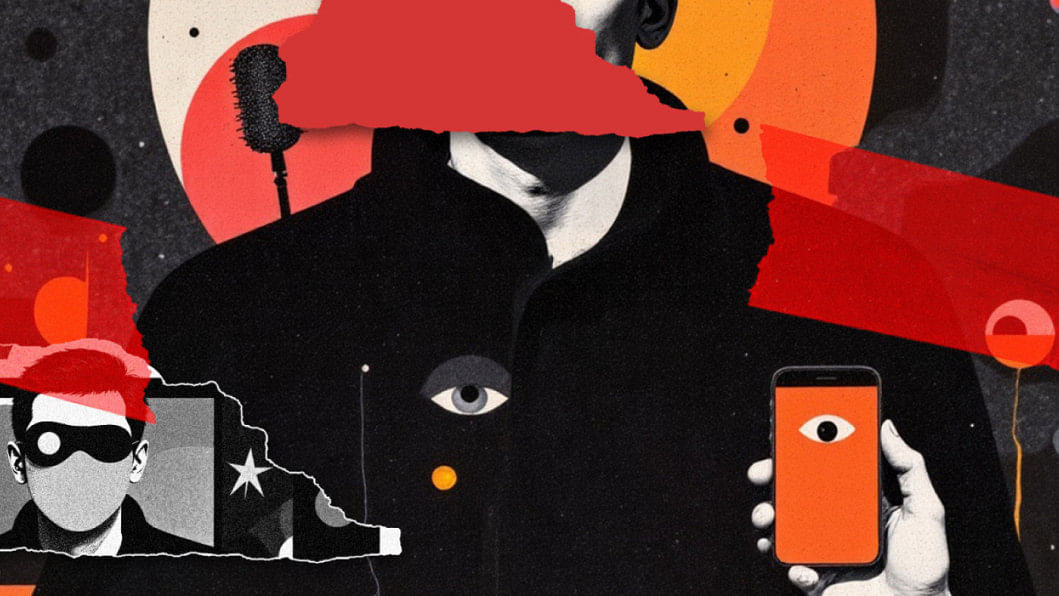For how long must women endure cyberattacks?

I used to host a show for The Daily Star titled "Straight From Star Newsroom." In it, our reporters elaborated and analysed the reports already printed in the newspaper, we broke down every detail for our readers. Reporters and I would work hard to make it engaging and informative.
However, after each episode was posted on Facebook, almost every comment used to be regarding my appearance. Whether or not I was wearing an orna (scarf), what my or the female reporters' body measurement was, how we looked—these were the topics of discussion instead of the content itself.
As the digital age advances, cybercrimes, along with the myriad forms of violence against women, have become a serious issue globally, and Bangladesh is no exception.
Among the most vulnerable groups to online threats are women, who are often targeted in specific ways reflecting societal gender disparities. Access to the internet has increased steadily across the country, making women more exposed to online threats. This has sparked concern, not only for the safety of women but also for their mental and emotional well-being.
Earlier this year, well-known actor Shabnam Faria was subjected to such online harassment as a worker of an NGO made inappropriate remarks on her Facebook post. The commenter, named Rakib, used the word "beshya," meaning sex worker, as she stood next to cricketers for a photo op.
The NGO rightly launched an investigation when the actor complained on social media and eventually sacked the employee, setting an example.
However, does the country's law protect women this way? And would other organisations follow suit? Would it happen if the victim were not a celebrity?
A study by NETZ Bangladesh conducted last year reveals that 78 percent of women in Bangladesh have experienced technology-facilitated violence against women (TF-VAW). These attacks range from offensive comments on social media to explicit content being shared without consent, often leading to severe consequences for the victims.
Such harassment range from sexist or derogatory comments to unsolicited messages, and even threats of physical violence as well as sexual assault. Social media platforms such as Facebook, X, and Instagram have become breeding grounds for such abuse. Women, particularly those in the public eye, are often targeted with their privacy violated constantly. Harassment is often a tool of manipulation and control in an attempt to silence women, especially those involved in activism or public discourse.
Nowadays, the trend is to call a woman Shahbagi for protesting violence against women. Like a content creator recently said, it is akin to the historic "burn the witches" practice of persecuting and executing individuals, particularly women, because they spoke against patriarchy.
Cyberstalking, also a form of harassment, is another major issue. In many cases, women are followed and monitored by perpetrators who use technology to track their activities. This can lead to real-world consequences, including emotional distress and even physical harm. For the victims of such stalking, the sense of safety is eroded as their personal information is compromised and used against them.
One of the most harmful forms of cyber violence is the non-consensual sharing of intimate images or videos, commonly referred to as "revenge porn." In Bangladesh, this form of abuse has been increasingly reported, often as a tactic of revenge or humiliation. Victims may face social ostracism, reputational damage, and severe emotional trauma.
Despite the legal provisions in place to punish such actions, many victims find themselves powerless to pursue justice due to stigma and a lack of technological know-how within the law enforcement.
Challenges
A key issue is the lack of awareness about cybersecurity measures. Many women do not fully understand how to protect their personal information or recognise the signs of cyber threats. This knowledge gap is compounded by limited access to technology, especially in rural areas where digital literacy is still low.
Additionally, there is a prevailing reluctance to report cybercrimes. Many women fear the social consequences of coming forward. The cultural norms surrounding gender in Bangladesh often discourage women from speaking out about abuse, particularly if it involves sexual harassment or assault. As a result, a large percentage of cyberattacks on women go unreported, allowing perpetrators to continue their harmful behaviour without facing consequences.
Another major hurdle is the lack of robust legal frameworks to combat such crimes. Although Bangladesh passed the Digital Security Act in 2018, which aimed to regulate online content and protect individuals from cybercrimes, critics argue that the law was flawed and inadequate. The same can be said about the Cyber Security Act, 2023, and perhaps even the Cyber Security Ordinance, 2024. More often than not, the laws have been used to muzzle dissent and criminalise online expression rather than protect women from abuse. Moreover, law enforcement agencies often lack the necessary training to handle digital evidence and track cybercriminals effectively.
Inadequate effort
There have been efforts from both the government and organisations to combat cyberattacks on women in Bangladesh. Institutions such as the Bangladesh Association of Software and Information Services (BASIS) have been working to raise awareness about online safety and provide women with tools to protect themselves. These organisations offer workshops and online resources aimed at educating women on cybersecurity, digital rights, and how to report online abuse.
Additionally, social media platforms and tech companies have been under increasing pressure to take responsibility for online harassment.
In 2020, the government introduced a series of measures that required social media platforms to comply with local regulations regarding the removal of harmful content. While these measures have faced criticism for potential censorship, they also highlight the growing recognition of the need for stronger protections against cyberviolence.
The role of law enforcement is also evolving. In recent years, the Bangladesh Police have set up a dedicated cybercrime unit to address online crimes, including those targeting women. This unit works closely with digital forensics experts to investigate cybercrimes and bring perpetrators to justice.
Despite these efforts, however, not much progress has been made in effectively combating cyber abuse against women in Bangladesh, as there is still a long way to go in terms of building public awareness and social responsibility.
Many women remain unaware of their digital rights, and access to resources and support systems is still limited outside major urban areas. Awareness campaigns and workshops, while valuable, do not always reach those most vulnerable. Moreover, the social stigma surrounding online harassment discourages many victims from reporting incidents or seeking help.
Tech companies, despite pressure, have been slow to implement meaningful changes. Harmful content often remains online for extended periods before being removed, and reporting mechanisms on social media platforms are frequently ineffective. Many victims find themselves caught in bureaucratic loops with little resolution.
Legal measures have also fallen short. While the government has introduced regulations, enforcement remains weak. Victims often face hurdles in filing complaints, and law enforcement responses are inconsistent. The dedicated cybercrime unit, though a step forward, struggles with underfunding, a lack of training, and a backlog of cases.
Overall, cyberattacks on women in Bangladesh are a significant and growing issue that needs urgent attention. While there have been strides in improving awareness and legal frameworks, much more needs to be done to protect women from online abuse—or any abuse for that matter.
Naziba Basher is a journalist at The Daily Star.
Views expressed in this article are the author's own.
Follow The Daily Star Opinion on Facebook for the latest opinions, commentaries and analyses by experts and professionals. To contribute your article or letter to The Daily Star Opinion, see our guidelines for submission.

 For all latest news, follow The Daily Star's Google News channel.
For all latest news, follow The Daily Star's Google News channel. 





Comments